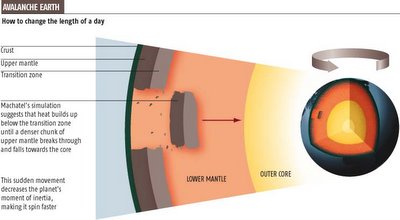
According to New Scientist, massive avalanches of molten rock inside the earth's mantle may affect the speed of the earth's rotation – briefly accelerating the planet. "Like an ice skater pulling in their arms," these internal landslides shift mass towards the earth's core, making the earth spin faster.
Over the long term, the earth is actually slowing down – yet weird anomalies in the planet's geological record suggest that short bursts of acceleration come, as if from nowhere, and last roughly ten million years before fading. "For the trilobites," for instance, "530 million years ago, one year contained about 420 days and each day lasted about 21 hours. Now we get a mere 365 days every year and our days last for 24 hours." Interestingly, "as time goes by, days and nights will continue to stretch" – meaning that every single day, albeit probably by only a few nanoseconds, is literally longer than the day before.
(PS: don't forget to set your clock forward tomorrow night).
So, when a runaway chunk of the earth's mantle starts to slide, it "carries on going, sliding through the lower mantle like a stone dropped into a pond," meaning that "a massive blob of rock the size of the Moon has shifted towards the centre of the Earth."

What I'd like to know is: could you deliberately bomb the internal fissures of the earth – using a new hydrogen bomb, nicknamed The Jules Verne – starting huge mantleslides that accelerate the planet's rotation so fantastically... that the skyscrapers of New York go flying into space?
No comments:
Post a Comment